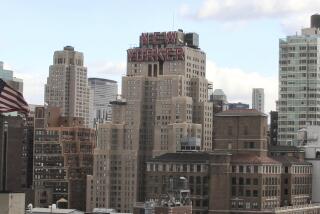Parretti Says He Still Owns MGM-Pathe : Entertainment: The embattled tycoon says a Delaware court took away his voting rights in the movie company, but it didn’t strip him of shares.
- Share via
ROME — Giancarlo Parretti, mogul in distress, strode volcanically through the baroque palazzo near the Trevi Fountain that serves both as his home and office. He summoned his wife to make coffee and complained to a daughter that two high-tech ceiling lights were out.
Family spirit and teamwork are especially important now; Parretti owes $800 million, give or take--mostly give--a few hundred million.
Creditors bay. Lawyers scuffle. On both sides of the Atlantic, in Italy and America, the law frowns at the tumultuous passage of the Umbrian olive grower’s son. He began his career as a waiter and blossomed into an international financier, casting a wake as broad--and as turbulent--as those of the passenger liners on which he once worked as a piano player.
Times are tough. But don’t count Giancarlo Parretti out, he said Wednesday, sliding into the admiral’s chair at his boat-shaped director’s table for 20 before a life-sized painting of an angel presenting a menu-like Bible to a half-seen saint.
“I have chosen the path of war,” he snapped, bridling at suggestions that he is the former owner of MGM-Pathe Communications Co., the historic Hollywood studio. “I don’t think I’ll lose MGM, because I am convinced that I am right.”
Parretti said a Delaware court decision last month giving legal control of the movie studio to the French bank Credit Lyonnais, which in 1990 lent him part of $1.3 billion to buy MGM, affects control of the company but not his ownership. Only Tuesday--presumably at Credit Lyonnais’ behest--veteran Hollywood executive Dennis C. Stanfill was named MGM’s co-chairman, charged with running the shaken studio’s business operations.
“I am not the ex-owner. The Delaware court gave away the voting rights, not the shares. The shares are mine, so the owner is me,” Parretti said. “They (the bank) can run it as they like. Who cares?”
Parretti insisted that legal maneuvering in the United States to prepare for an eventual sale would give him up to 10 months to find money to repay his debt. “I’ve found backers before. I’ll find one now,” he said. “If I had one already, I wouldn’t tell you about it.”
The normally press-wary Parretti, 50, went public this week after his Jan. 10 release from jail, where he was briefly held on charges of conspiring to avoid paying more than $200 million in taxes to Italy. He would not discuss details of the case but said the charge had been suspended.
At a press conference-turned-melee Tuesday, Parretti said he would not appeal the Delaware court decision but called it a “Pyrrhic victory” for the bank.
“Had I won the court case, the bank could have bankrupted me by withholding money,” he said. “Now that they have won, they have to put money into MGM.”
Ruling that he had lied, the Delaware court removed Parretti and his family from the board of MGM-Pathe. After six months of hearings, the judge agreed with Credit Lyonnais that Parretti had brought the company to the brink of bankruptcy.
Parretti’s career often has been marked by financial and judicial turmoil. He is appealing a three-year, 10-month sentence in Naples for fraudulent bankruptcy in the collapse of a newspaper he founded in 1981. He also faces charges in Sicily of “delinquent association” and hiding company profits.
For a time last year, he lost his American visa after the U.S. Immigration and Naturalization Service made--then retracted--an allegation that he had failed to disclose “extensive” criminal charges against him in Italy.
“Makes you laugh, doesn’t it? That’s a form of racism, isn’t it?” Parretti shot back Wednesday. “To someone who’s invested $2 billion, you say, ‘I’ll take your visa away because you’ve done something; there’s a crime which you haven’t told me about--I don’t know if it’s true or not.’ A little crime from 1977, worth nothing, a stupidity. . . . I still have my visa--but because I have a lawyer and I’ve paid $200,000. But if I didn’t have a lawyer, what would I have done? Nothing. I would have done what a Mexican does.”
His total debts are about $800 million, Parretti said. But he added that his companies around the world--”around 700 of them”--continue operating normally.
Long a controversial figure, Parretti’s meteoric rise from humble origins brought whispers of connections with organized crime, which he vehemently denies.
“In America, Italian means Mafioso, “ he said. “They make no distinction. The whole world is either black or white. Cuomo--why doesn’t he stand for election? When Geraldine Ferraro ran for vice president, they made a great fuss. Racism in Italy? In America it really does exist.”
Musing about the difference between life in Italy and in Hollywood, Parretti said: “What surprised me most about America is that they give no weight to negative things. Another thing which shocked me is this kind of puritanism. Gary Hart goes with a woman . . . so he can’t run for President! It’s like the houses--all clean in front, dirty behind.”
Parretti acknowledged that he could never be mistaken for a run-of-the-mill California tycoon: “I’m a little crazy . . . in the sense that I’m uncontrollable, not from the Establishment. . . . This makes waves, creates concern.”
Still, he said, Los Angeles marches to a strident drummer, loudly heard.
“In L.A., if you arrive with money, you can do everything. Without money, you can do nothing,” Parretti philosophized. “I brought $2 billion.”
More to Read
The biggest entertainment stories
Get our big stories about Hollywood, film, television, music, arts, culture and more right in your inbox as soon as they publish.
You may occasionally receive promotional content from the Los Angeles Times.










